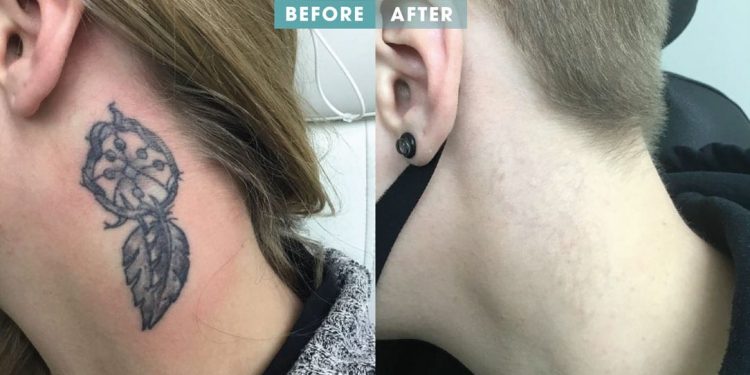There are many different ways to remove tattoos, and each method has its pros and cons, including cost, recovery time, and effectiveness. Knowing what you should expect before getting a tattoo removed is key to making the best choice for your specific situation. Listed below are some of the options and how long they take. After reading this article, you should feel comfortable making the decision. Here’s a look at the before and after photos of various tattoo removal methods.
Laser tattoo removal is a gradual process.
When removing a tattoo, a Q-switched laser uses a pulse of intense light penetrating the skin. It heats the ink particles, which the body’s immune system flushes away. Laser treatments gradually break down the ink particles until none are left. Because different wavelengths of light target different pigments, laser treatments are safe and effective. The laser treatment will usually take several sessions, so it is advisable to seek treatment for tattoo removal as a series.
After the third session, the results will begin to show. While the process may take several sessions, the tattoo will gradually fade as the skin heals between sessions. The treatment usually lasts four to six weeks, although you may need to schedule more frequent appointments if your skin is sensitive. Once the treatment is complete, you can expect to see the final result within a few months. Within a year, the tattoo should be almost completely gone.
The procedure may feel uncomfortable, but the level of discomfort depends on your tolerance for pain. Topical anesthetic cream is applied to the tattoo area before the procedure to minimize the discomfort. Afterward, discomfort is similar to the pain experienced when they place the tattoo, but it’s much less intense. A mild sunburn is more likely than a tattoo. It is natural for the area treated to experience minor blistering and itching. The blistering lasts up to two weeks.
The number of sessions required to remove a tattoo depends on its size. Larger tattoos require more sessions because they cover more skin and use more ink. Smaller tattoos may only need four to six sessions. As with any other cosmetic procedure, laser tattoo removal takes time. However, the results will be visible after each session. The more sessions you undergo, the more progress you can expect. However, don’t expect to see an immediate improvement.
It does not cause permanent scarring.
Although getting permanent scarring after tattoo removal is possible, you should be careful not to pick at the area. The skin will heal with a red or purple color. It is also essential to take proper care of the site. Not caring for the area will cause scarring. You should not pick at the location, as it will likely become infected again. The skin is also prone to scarring if you touch it frequently.
Tattooed skin is susceptible to infection during the removal process, so it is essential to take the following precautions to prevent disease:
- Wash the area thoroughly and apply antibiotic ointment.
- Avoid harsh soaps, as they can irritate the skin and cause inflammation.
- Always avoid touching or rubbing the area, as this may cause premature scab removal and make the healing process take longer.
- Avoid popping blisters or picking at the tattoo.
While scarring is common after tattoo removal, it is not a permanent problem. Laser tattoo removal is effective because it does not damage skin cells, instead targeting the pigmentation underneath. In addition, laser tattoo removal only targets the layer of skin that contains ink or pigment, not the skin itself. It means that unless you have a history of keloid scarring, you shouldn’t worry about permanent scarring.
Laser removal is a good option for people who don’t want a permanent tattoo. This technique can remove permanent tattoos, but the results will depend on the patient’s skin type and the area of the skin. If you have dark skin, dermabrasion may not be suitable for you. The treatment may result in a pigment change, which is unattractive. There is also a risk of infection.
It is similar to IPL (intense pulsed light) hair removal.
The basic concept of IPL (intense pulsed light), which you can use for hair removal, is that a broad spectrum of light can be focused on a particular area and cause a change in the pigment within the hair follicle. The resulting temperature change destroys the cells responsible for hair growth and prevents the hair follicle from growing. Each treatment slows hair regrowth, and the intervals between treatments can be up to eight weeks.
While dermatologists and aesthetician offices usually perform professional IPL hair removal, there are also at-home IPL devices available. These devices offer similar results and are far cheaper than professional treatments. Although professional treatments are more expensive and require more treatments, at-home devices provide convenience, ease of use, and a lower cost. Regardless of the type of treatment you’d like to pursue, selecting a device with a long lifespan and the ability to treat various body parts is essential.
The most crucial difference between IPL and traditional hair removal is the amount of pain. A patient may experience a stinging sensation for 4 to 6 hours after the procedure. A cool compress or moist cloth can help ease the pain. Swelling may also occur after the procedure. It can last a few days and may require additional sessions, and most patients can safely undergo IPL treatments. While it is unsafe for everyone, those on blood thinners and pregnant women should not undergo IPL treatments.
Laser hair removal uses a monochromatic laser to destroy the pigment in the hair follicle. Lasers are effective for hair removal but not suitable for sensitive skin. Lasers are safer than IPL for most people. Intense pulsed light has similar results but is gentler. People with sensitive skin may prefer IPL over Laser for removing unwanted hair.
It is more effective on darker skin tones.
More patients are obtaining hair removal treatments with more extended wavelength lasers. However, prospective patients with darker skin tones need to be aware of the contraindications for laser hair removal. It means effective marketing and continuing education are necessary for attracting these patients. The availability of treatment technologies is also essential for this group. However, darker skin tones only sometimes present a more complex case. However, they may have different concerns about the safety of laser treatments.
It is less expensive than surgery.
You can do several methods of tattoo removal on a patient’s skin. Each option has pros and cons in terms of price and turnaround time. Knowing about these differences in the removal process can help you make the right decision. Fortunately, most of these methods are not as invasive as some think. The following are some of the most common:
Dermabrasion: This treatment involves sanding the tattooed area to remove the ink. The downside to this treatment is that it often leaves scarring behind. Nonetheless, it is less expensive than surgery to remove tattoos. Dermabrasion costs about PS50 for a small tattoo, while a bigger one can run you $3,000 or more. While tattoo removal creams may appear affordable, they don’t altogether remove the ink and may even make the tattoo less noticeable.
A doctor can charge hundreds of dollars per session to remove tattoos. According to the American Society for Aesthetic Plastic Surgery, the cost of a single tattoo removal session can exceed $1700. However, it’s worth the expense for some people. This procedure may leave a permanent scar, but it’s much less painful than a tattoo removal procedure. The cost of tattoo removal also depends on the tattoo’s size and how much skin is covered.
Another option for tattoo removal is laser treatment. Laser treatments don’t altogether remove the tattoo, but they can drastically lighten it. It’s important to note that laser treatments are more expensive than skin-removal creams. A doctor’s office will charge you a higher fee for laser tattoo removal, but it’s still less costly than surgery. If you have a tattoo, choosing the right surgeon is essential.

















